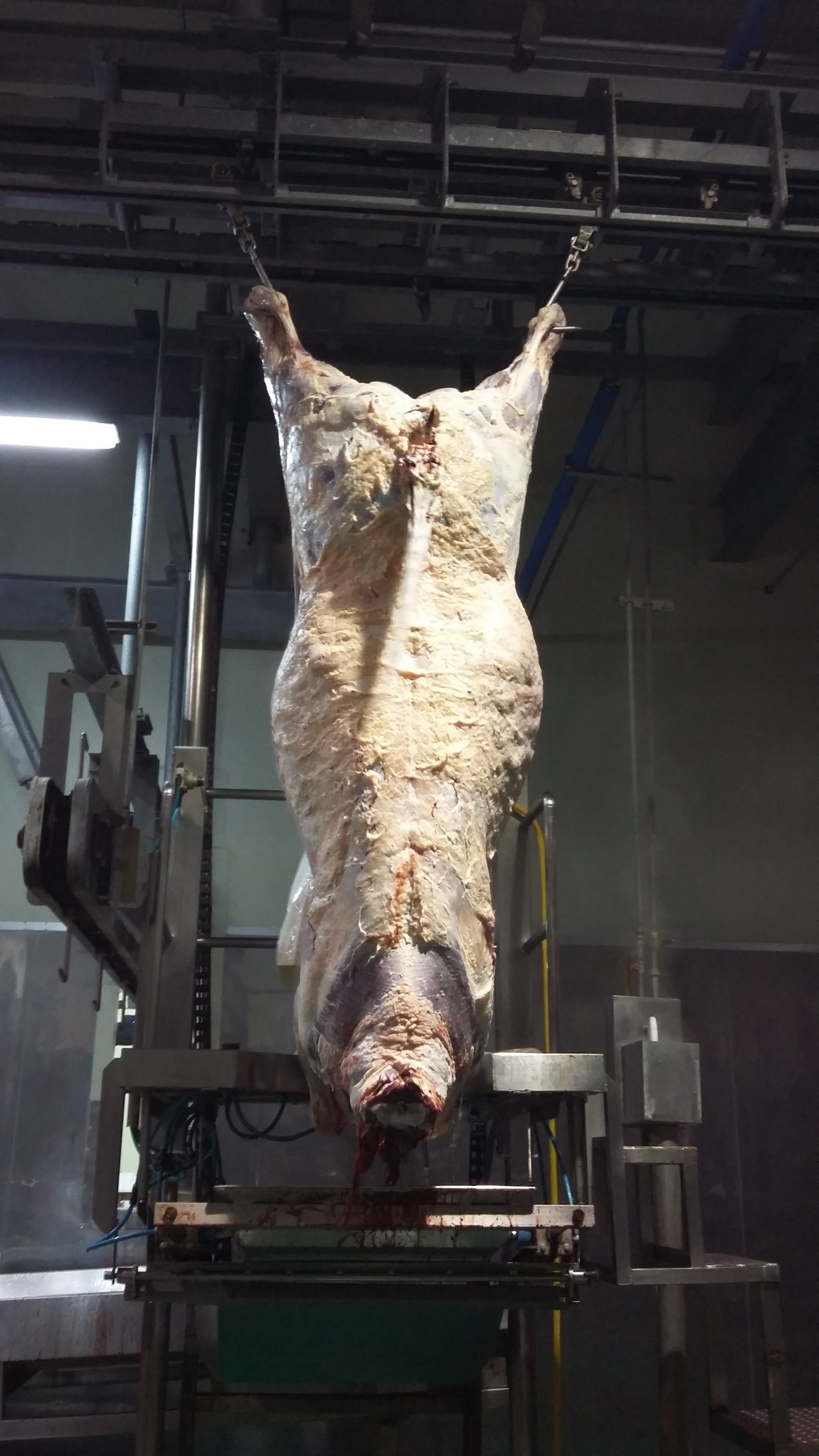Polimorfismos en genes candidatos a la composición de ácidos grasos y su efecto en carne Wagyu-Cross
Candidate gene polymorphism effects on the fatty acid composition of Wagyu-Cross beef

Esta obra está bajo una licencia internacional Creative Commons Atribución-NoComercial-CompartirIgual 4.0.
Mostrar biografía de los autores
Objetivo. Comparar la composición de ácidos grasos (FA) en la carne Wagyu y sus cruzas con Angus, Beefmaster, Brangus y Hereford, y analizar su relación con marcadores genéticos del metabolismo lipídico. Materiales y metodos. Se colectaron 111 muestras de Longissimus dorsi, las cuales se agruparon por grupo genético, se cuantificaron los FA (cromatografía de gases líquidos) y se tipificaron marcadores de ADN asociados teóricamente a FA. Se examinó el equilibrio de Hardy-Weinberg y desequilibrio de ligamiento de los marcadores y se estimó el efecto de las cruzas y el efecto de los genotipos. Resultados. Las cruzas no mostraron diferencias substanciales en la composición de FA con respecto a Wagyu. Nueve SNPs mostraron asociación con la composición de FA, y se encontró un efecto importante en el marcador SLC2A4 ss62538460, el cual influyó sobre SFA, MUFA y MUFA/SFA. Los marcadores, PLTP ss77832104 y IGF2R ss77831885 influyeron sobre C16:0, MYOZ1 ss77832104 sobre C17:1 y PPARGC1A c.1892+19 sobre C18:2. Además, se comprobaron efectos previamente descritos de MEF2C ss38329156 y SCD c.878. Conclusiones. Los presentes resultados representan una de las primeras evidencias sobre la deposición de FA en ganado Wagyu y sus cruzas y propone algunos loci en genes candidatos con posibilidad de implementación en estrategias de mejoramiento asistido.
Visitas del artículo 427 | Visitas PDF
Descargas
- Motoyama M, Sasaki K, Watanabe A. Wagyu and the factors contributing to its beef quality: A Japanese industry overview. Meat Sci. 2016; 120:10–18. http://dx.doi.org/10.1016/j.meatsci.2016.04.026
- Gotoh T, Nishimura T, Kuchida K, Mannen H. The Japanese Wagyu beef industry: current situation and future prospects - A review. Asian-australas J Anim Sci. 2018; 31(7):933–950. http://dx.doi.org/10.5713/ajas.18.0333
- Nguyen DV, Nguyen OC, Malau-Aduli AEO. Main regulatory factors of marbling level in beef cattle. Vet Anim Sci. 2021; 14(100219):100219. http://dx.doi.org/10.1016/j.vas.2021.100219
- Frank D, Ball A, Hughes J, Krishnamurthy R, Piyasiri U, Stark J, et al. Sensory and flavor chemistry characteristics of Australian beef: Influence of intramuscular fat, feed, and breed. J Agric Food Chem. 2016; 64(21):4299–4311. http://dx.doi.org/10.1021/acs.jafc.6b00160
- Jung E-Y, Hwang Y-H, Joo S-T. The relationship between chemical compositions, meat quality, and palatability of the 10 primal cuts from Hanwoo steer. Korean J Food Sci Anim Resour. 2016; 36(2):145–151. http://dx.doi.org/10.5851/kosfa.2016.36.2.145
- Troy DJ, Tiwari BK, Joo S-T. Health implications of beef intramuscular fat consumption. Korean J Food Sci Anim Resour. 2016; 36(5):577–582. http://dx.doi.org/10.5851/kosfa.2016.36.5.577
- Forouhi NG, Koulman A, Sharp SJ, Imamura F, Kröger J, Schulze MB, et al. Differences in the prospective association between individual plasma phospholipid saturated fatty acids and incident type 2 diabetes: the EPIC-InterAct case-cohort study. Lancet Diabetes Endocrinol. 2014; 2(10):810–818. http://dx.doi.org/10.1016/S2213-8587(14)70146-9
- O’Quinn TG, Woerner DR, Engle TE, Chapman PL, Legako JF, Brooks JC, et al. Identifying consumer preferences for specific beef flavor characteristics in relation to cattle production and postmortem processing parameters. Meat Sci. 2016; 112:90–102. http://dx.doi.org/10.1016/j.meatsci.2015.11.001
- May SG, Sturdivant CA, Lunt DK, Miller RK, Smith SB. Comparison of sensory characteristics and fatty acid composition between Wagyu crossbred and Angus steers. Meat Sci. 1993; 35(3):289–298. http://dx.doi.org/10.1016/0309-1740(93)90034-F
- Shirouchi B, Albrecht E, Nuernberg G, Maak S, Olavanh S, Nakamura Y, et al. Fatty acid profiles and adipogenic gene expression of various fat depots in Japanese Black and Holstein steers. Meat Sci. 2014; 96(1):157–164. https://doi.org/10.1016/j.meatsci.2013.06.027
- Vela DAV. Caracterización genética y fenotípica de la carne de res comercializada en el note de Mexico, con énfasis en la composición de los ácidos grasos. Instituto Politécnico Nacional: Mexico; 2018. http://tesis.ipn.mx/handle/123456789/26866
- Rousset F. genepop’007: a complete re-implementation of the genepop software for Windows and Linux. Mol Ecol Resour. 2008; 8(1):103–106. http://dx.doi.org/10.1111/j.1471-8286.2007.01931.x
- Corbin CH, O’Quinn TG, Garmyn AJ, Legako JF, Hunt MR, Dinh TTN, et al. Sensory evaluation of tender beef strip loin steaks of varying marbling levels and quality treatments. Meat Sci. 2015; 100:24–31. http://dx.doi.org/10.1016/j.meatsci.2014.09.009
- Stewart SM, Gardner GE, McGilchrist P, Pethick DW, Polkinghorne R, Thompson JM, et al. Prediction of consumer palatability in beef using visual marbling scores and chemical intramuscular fat percentage. Meat Sci. 2021; 181(108322):108322. http://dx.doi.org/10.1016/j.meatsci.2020.108322
- Khaw K-T, Friesen MD, Riboli E, Luben R, Wareham N. Plasma phospholipid fatty acid concentration and incident coronary heart disease in men and women: the EPIC-Norfolk prospective study. PLoS Med. 2012; 9(7):e1001255. http://dx.doi.org/10.1371/journal.pmed.1001255
- Hwang Y-H, Joo S-T. Fatty acid profiles, meat quality, and sensory palatability of grain-fed and grass-fed beef from Hanwoo, American, and Australian crossbred cattle. Korean J Food Sci Anim Resour. 2017; 37(2):153–161. http://dx.doi.org/10.5851/kosfa.2017.37.2.153
- Barendse W. Should animal fats be back on the table? A critical review of the human health effects of animal fat. Anim Prod Sci. 2014; 54(7):831-855. http://dx.doi.org/10.1071/an13536
- Wood JD, Enser M. Manipulating the fatty acid composition of meat to improve nutritional value and meat quality. En: New Aspects of Meat Quality. Elsevier; 2017. https://doi.org/10.1016/B978-0-08-100593-4.00023-0
- Romero MC, Romero AM, Doval MM, Judis MA. Nutritional value and fatty acid composition of some traditional Argentinean meat sausages. Food Sci Technol. 2013; 33(1):161–166. http://dx.doi.org/10.1590/s0101-20612013005000007
- Flowers S, Hamblen H, Leal-Gutiérrez JD, Elzo MA, Johnson DD, Mateescu RG. Fatty acid profile, mineral content, and palatability of beef from a multibreed Angus-Brahman population. J Anim Sci. 2018; 96(10):4264–4275. http://dx.doi.org/10.1093/jas/sky300
- Scollan ND, Dannenberger D, Nuernberg K, Richardson I, MacKintosh S, Hocquette J-F, et al. Enhancing the nutritional and health value of beef lipids and their relationship with meat quality. Meat Sci. 2014; 97(3):384–394. http://dx.doi.org/10.1016/j.meatsci.2014.02.015
- Venn-Watson S, Lumpkin R, Dennis EA. Efficacy of dietary odd-chain saturated fatty acid pentadecanoic acid parallels broad associated health benefits in humans: could it be essential? Sci Rep. 2020;10(1):8161. http://dx.doi.org/10.1038/s41598-020-64960-y
- Xie YR, Busboom JR, Gaskins CT, Johnson KA, Reeves JJ, Wright RW, et al. Effects of breed and sire on carcass characteristics and fatty acid profiles of crossbred wagyu and angus steers. Meat Sci. 1996; 43(2):167–177. http://dx.doi.org/10.1016/0309-1740(96)84588-8
- Chung KY, Lunt DK, Choi CB, Chae SH, Rhoades RD, Adams TH, et al. Lipid characteristics of subcutaneous adipose tissue and M. longissimus thoracis of Angus and Wagyu steers fed to US and Japanese endpoints. Meat Sci. 2006; 73(3):432–441. http://dx.doi.org/10.1016/j.meatsci.2006.01.002
- Papaleo Mazzucco J, Goszczynski DE, Ripoli MV, Melucci LM, Pardo AM, Colatto E, et al. Growth, carcass and meat quality traits in beef from Angus, Hereford and cross-breed grazing steers, and their association with SNPs in genes related to fat deposition metabolism. Meat Sci. 2016; 114:121–129. http://dx.doi.org/10.1016/j.meatsci.2015.12.018
- Domingo G, Iglesias A, Monserrat L, Sanchez L, Cantalapiedra J, Lorenzo JM. Effect of crossbreeding with Limousine, Rubia Gallega and Belgium Blue on meat quality and fatty acid profile of Holstein calves: Effect of Crossbreeding on Meat Quality. Anim Sci J. 2015; 86(11):913–921. http://dx.doi.org/10.1111/asj.12373
- Garcia D, Shaw RJ. AMPK: Mechanisms of cellular energy sensing and restoration of metabolic balance. Mol Cell. 2017; 66(6):789–800. http://dx.doi.org/10.1016/j.molcel.2017.05.032
- Sevane N, Armstrong E, Cortés O, Wiener P, Wong RP, Dunner S, et al. Association of bovine meat quality traits with genes included in the PPARG and PPARGC1A networks. Meat Sci. 2013; 94(3):328–335. http://dx.doi.org/10.1016/j.meatsci.2013.02.014
- Weikard R, Kühn C, Goldammer T, Freyer G, Schwerin M. The bovine PPARGC1A gene: molecular characterization and association of an SNP with variation of milk fat synthesis. Physiol Genomics. 2005; 21(1):1–13. http://dx.doi.org/10.1152/physiolgenomics.00103.2004
- Pasandideh M, Mohammadabadi MR, Esmailizadeh AK, Tarang A. Association of bovine PPARGC1A and OPN genes with milk production and composition in Holstein cattle. Czech J Anim Sci. 2016; 60(3):97–104. http://dx.doi.org/10.17221/8074-cjas
- Koba K, Yanagita T. Health benefits of conjugated linoleic acid (CLA). Obes Res Clin Pract. 2014; 8(6):e525-e532. http://dx.doi.org/10.1016/j.orcp.2013.10.001
- Taniguchi M, Utsugi T, Oyama K, Mannen H, Kobayashi M, Tanabe Y, et al. Genotype of stearoyl-coA desaturase is associated with fatty acid composition in Japanese Black cattle. Mamm Genome. 2004; 15(2):142–148. http://dx.doi.org/10.1007/s00335-003-2286-8
- Li C, Aldai N, Vinsky M, Dugan MER, McAllister TA. Association analyses of single nucleotide polymorphisms in bovine stearoyl-CoA desaturase and fatty acid synthase genes with fatty acid composition in commercial cross-bred beef steers: SCD and FASN SNPs and fatty acids. Anim Genet. 2012; 43(1):93–107. http://dx.doi.org/10.1111/j.1365-2052.2011.02217.x
- Oh D-Y, Lee Y-S, Yeo J-S. Identification of the SNP (single necleotide polymorphism) of the stearoyl-CoA desaturase (SCD) associated with unsaturated fatty acid in Hanwoo (Korean cattle). Asian-australas J Anim Sci. 2011; 24(6):757–765. http://dx.doi.org/10.5713/ajas.2011.10410
- Dunner S, Sevane N, Garcia D, Levéziel H, Williams JL, Mangin B, et al. Genes involved in muscle lipid composition in 15 European Bos taurus breeds. Anim Genet. 2013; 44(5):493–501. http://dx.doi.org/10.1111/age.12044
- Sevane N, Levéziel H, Nute GR, Sañudo C, Valentini A, Williams J, et al. Phenotypic and genotypic background underlying variations in fatty acid composition and sensory parameters in European bovine breeds. J Anim Sci Biotechnol. 2014; 5(1):20. http://dx.doi.org/10.1186/2049-1891-5-20
- Grisart B, Coppieters W, Farnir F, Karim L, Ford C, Berzi P, et al. Positional candidate cloning of a QTL in dairy cattle: identification of a missense mutation in the bovine DGAT1 gene with major effect on milk yield and composition. Genome Res. 2002; 12(2):222-231. http://dx.doi.org/10.1101/gr.224202
- Medrano JF, Rincon G. SNPs associated with fatty acid composition of bovine meat and milk. U.S. Patent 8,551,703. 2013.
























